The Chihuahua
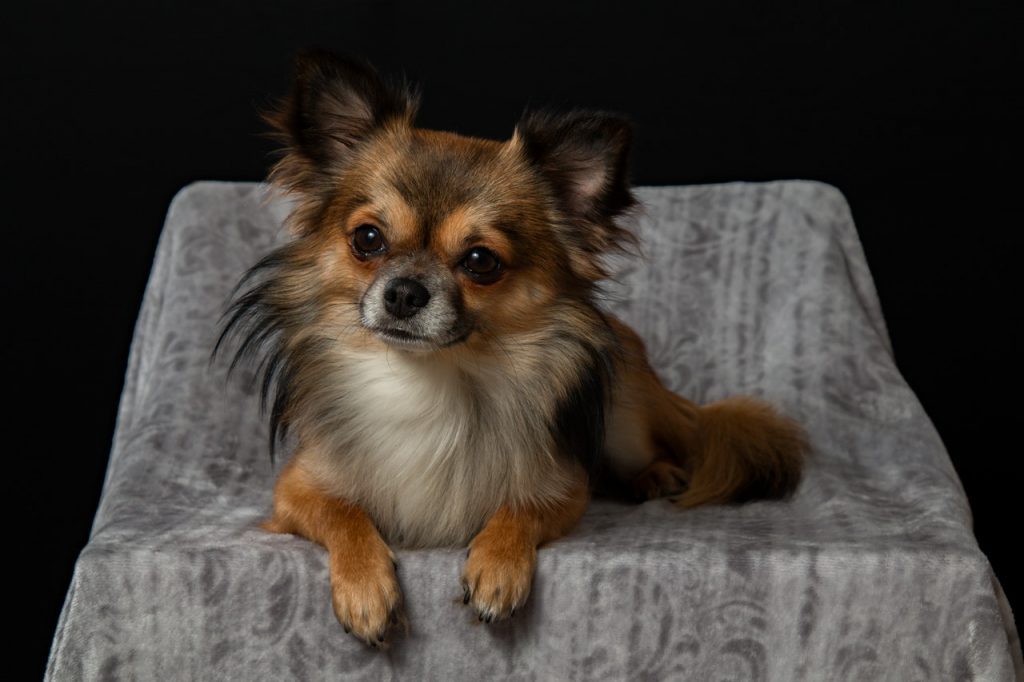

This month, we are coming back to you with a new “Dog Of The Month” blog post! After writing about the Doberman Pinscher back in March, and about the Greyhound in April, we have chosen to praise one of the smallest dogs in the world, if not the smallest dog in the world. We hope you enjoy reading about the Chihuahua as much as we enjoy writing about it!
Jump To Any Section You Would Like To Read
A Brief Introduction
The Chihuahua is a very popular breed throughout the world due its small size and its cute looks. But the Chihuahua is so much more than that, and you will be surprised if you believe that this dog is just all cuteness and no trouble.
They are part of the companion group, making them a loyal dog that will love you more than anything. They may be the world’s smallest dog, but within this small body, you will find one hell of a personality. Due to their small size, many Chihuahua owners make the error of treating them more like babies rather than dogs, and to not train them. But this is a big mistake that will probably have a great impact on their personality as adult dogs. Chihuahuas are real dogs, just like any other dog. Therefore, they need to be treated and educated just like any other dog. They actually love to be seen for what they are and are highly intelligent. With the right treatment and education, this little dog will make you the happiest and proudest dog owner, without a doubt!
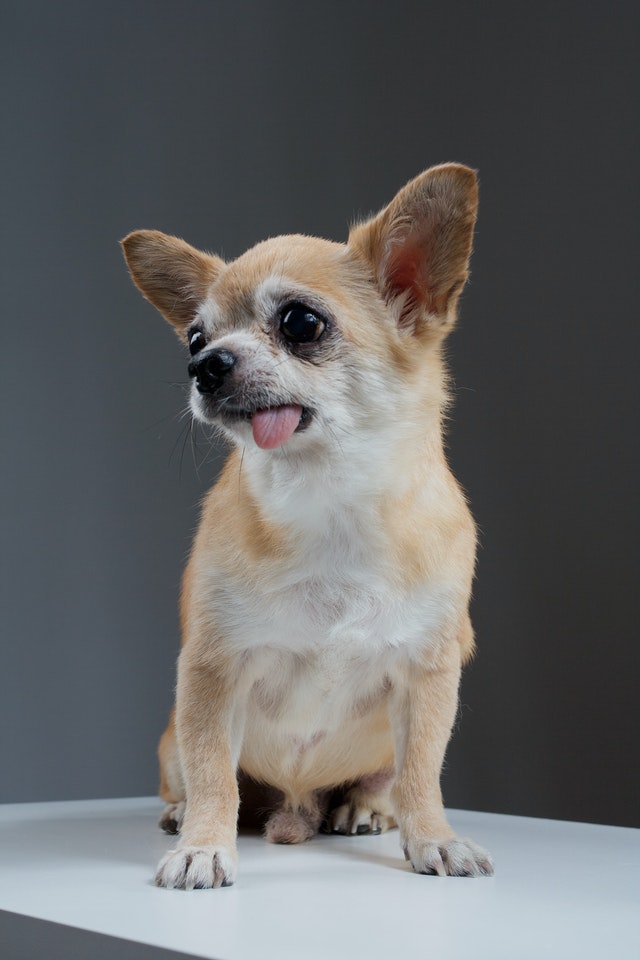

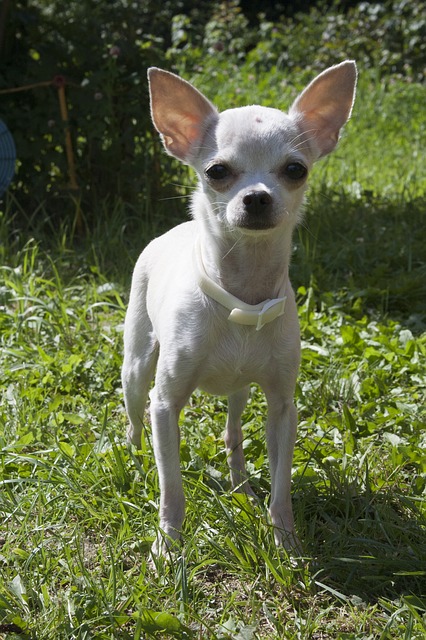

Where Does The Chihuahua Come From?
Just like for any breed, it is hard to find the exact origins of the Chihuahua. What we know for sure is that the Chihuahua as we know it was first found in Mexico, in the region of Chihuahua, during the 19th century.
Concerning their origins before that, it is very hard to exactly trace them, but there are a few theories about where they could come from.
One of the main theories is that Spanish traders brought the famous Chinese hairless dog with them to Mexico, and decided to breed them with mexican dogs.
The second main theory is that the Chihuahua descended from a dog breed that is now extinct, called the Techichi. The Techichi was a dog found in Central America a few centuries ago. There are traces of them already existing during the 9th century, when the Toltec civilisation was thriving. The Techichi is believed to have been considered sacred by the Toltec tribe. When the Aztecs took over, it is believed that they adopted the Techichi, making dogs an important part of their culture and society. The Techichi was part of the Aztecs’ rituals and many of them were kept in temples. The Aztecs believed that they had some kind of mystical powers and could see in the future. Eventually, the Spanish conquered the Aztecs in the late 1500s and the Techichi slowly disappeared.
Whether the Chihuahua really is a descendant of the Techichi or not is hard to prove but many paintings made by the Toltec and Aztec tribes show the Techichi as a small dog with similar features as the Chihuahua.
What Are The Physical Characteristics Of The Chihuahua?
As said above, the Chihuahua is known to be the smallest dog in the world, measuring only 15cm to 23cm (6 inches to 9 inches) tall at the shoulder and weighing only 1.3kg to 2.7kg (3 to 6 pounds). They are known to have a very distinctive look due to their round-shaped skull, round large eyes and pointy erect ears. Their body is rather small and condensed but very elegant and actually quite long compared to their height.
There are two varieties of Chihuahuas: the Smooth Coated Chihuahua (short-haired) and the Long Coated Chihuahua (long-haired). The Smooth Coated Chihuahua has short, thick and shiny hair, while the Long Coated Chihuahua has soft, flat and longer hair, their hair being particularly longer at the tip of the ears, on the tail, on their legs and on their chest and belly.
Both kinds come in a variety of colours and markings. Their coat can be of just one solid colour or with three different colours. The most recurrent colours in the Chihuahua are black, white, fawn, brown, and tan.
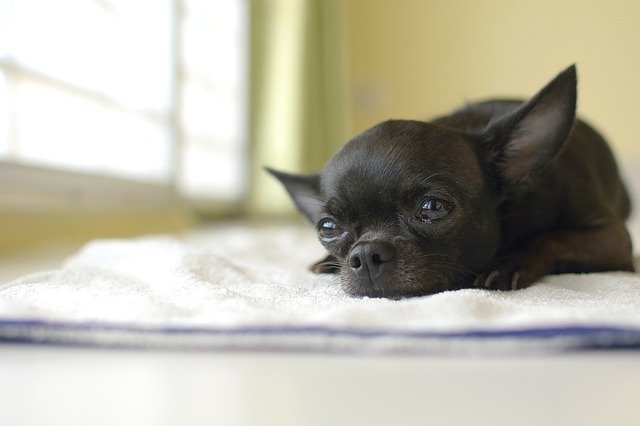

What Is Their Personality Like?
It is fair to say that the Chihuahua’s personality is not in proportion to their size. In fact, it is the opposite of their size, as they have a really big personality.
If you decide to adopt a Chihuahua, you will soon find out that this dog will be your most loyal friend. They are loving, tend to bond more with one person but will love their whole family too, and are very affectionate. They do not like to be left alone and require a lot of attention. It is fair to say that they are quite needy and like to follow their owner everywhere. In fact, if they don’t get the attention they need, they can become quite jealous. This is why you need to be careful if you have kids. They can be kid friendly but can feel quite stressed around them if not used to kids from a young age. It is also important that you make sure your kids do not act violently or accidently hurt your dog, as the dog could quickly feel threatened. Chihuahuas can easily get hurt due to their small size so it is important to be gentle with them.
Just like any dog, they need to be properly trained, educated and socialised from puppyhood. This will stop them from being nervous in different situations. It is important to get your dog trained no matter their breed. The Chihuahua can particularly be quite a handful and dominant, so we can’t stress enough on how important it is to train them.
The Chihuahua is quite suspicious of people they don’t know, making it hard for them to trust people at first. They are quick to learn as they are very intelligent and will enjoy learning and being trained if having fun at the same time. On the other hand, due to their confidence, sassiness and their big temper, they can be harder than other dogs to train. It is important to show them that you are the one in control, or they will not listen. It is also recommended to get them trained by a professional. The Chihuahua is receptive to positive reinforcement and it is better to avoid any kind of punishment as they will lose the trust they have in you if you punish them.
Most people believe that small dogs do not need to be trained. The truth is, every dog needs to be trained and socialised from a young age. If not trained correctly, the Chihuahua can fall into aggression towards strangers, other animals, and even family members if feeling jealous or threatened. The reasons behind a Chihuahua’s aggressivity are countless. Dominance, territorial behaviour, anxiety,… Just like every other dog, the Chihuahua can suffer from these things. On top of that, the Chihuahua is a very small dog and can suffer from the “small-dog-syndrome.” It is important to remember that the Chihuahua should be treated and trained the same way as any other breed. Misbehaviour should not be tolerated and should be fixed. A well educated Chihuahua should never show any sign of aggression. If your Chihuahua has never shown any sign of aggression before but suddenly does, you should consider taking them to the vet to make sure they have no pain or injury. Dogs can become aggressive when injured.
The Chihuahua is a highly adaptable dog and will not have a problem with apartment life. They can be good watch dogs as their hearing is very developed. On the other hand, this makes them prone to barking a lot at any noise or sound, but this behaviour can be fixed with training.
In conclusion, the Chihuahua is really just like any other dog and needs to be considered the same way as any other dog. They will love you and respect you for treating them for what they are: a dog. If trained and educated correctly, your Chihuahua will be the most perfect companion.
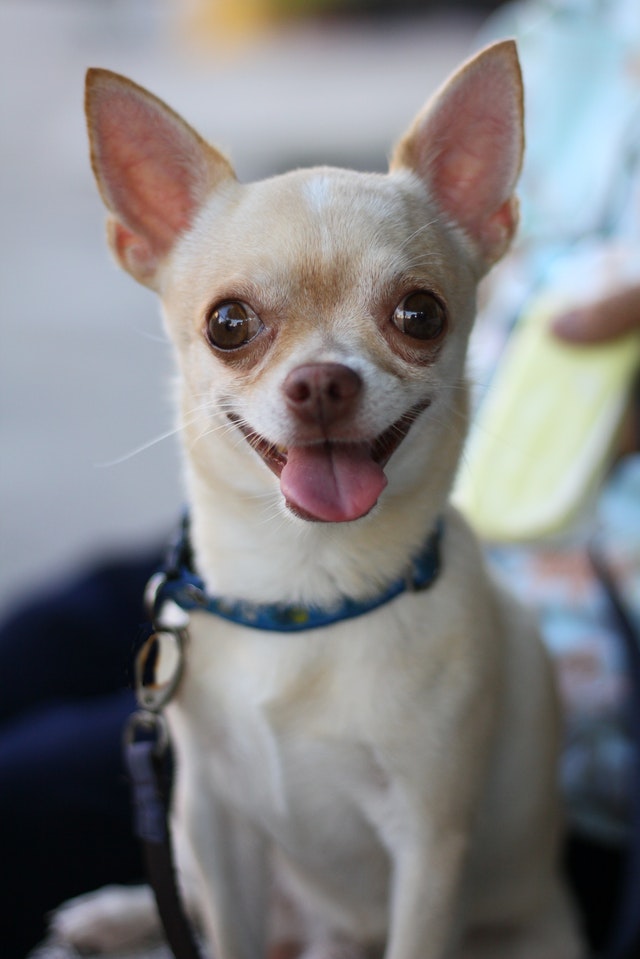

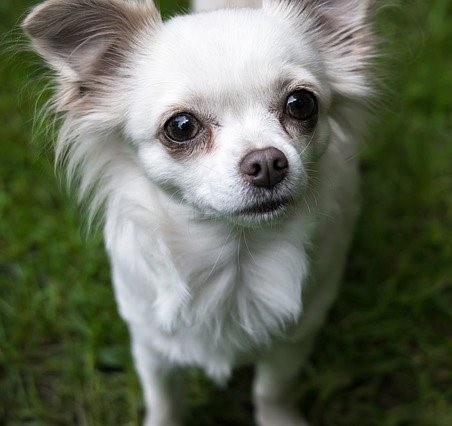

How To Take Proper Care Of The Chihuahua?
Nutrition:
Dogs are canines and descendants of wolves. Most people believe that this makes them carnivores, but dogs, just like wolves, are in fact omnivores that require both meat and plants in their diet.
A dog’s stomach in general is not designed to digest carbohydrates. Carbohydrates are a type of nutrient found in certain foods. While dogs should not be eating too many carbs, they are fine in small quantities. They are actually often found in dog dry food. It is important that your dog is fed a balanced diet. We recommend you should speak to your veterinarian if you have any questions or concerns about your dog’s diet.
Puppies and dogs under 1 years old usually require a special diet designed just for them so they can grow healthy and strong. Again, always ask your veterinarian what are the best options for your puppy if you have any doubt.
The main foods to avoid when feeding your dog are:
- Any food that contains Xylitol, which is an artificial sweetener that can cause liver failure, brain damage or seizures in your dog.
- Chocolate, coffee and caffeine in general as they contain methylxanthines which are very harmful for your dog.
- Avocados are to be avoided as they are very poisonous to dogs. They contain Persin which can cause severe vomiting and diarrhoea.
- Onion, garlic and chives in all shapes. They are very irritating to a dog’s digestive system.
- Citrus are to be avoided as they usually contain a high amount of citric acid which can be very irritating for your dog’s bowels.
- Grapes and raisins, which can be very toxic for your four-legged friend and cause them to have kidney failure.
- Any food that contains a lot of salt, as it can cause uncontrollable thirst as well as sodium ion poisoning.
- Nuts are to be avoided, as they contain too much fats and oils. Macadamia nuts in particular should be avoided as they contain a toxin that can affect the muscles and the nervous system of your dog.
- Alcohol should never be given to your dog as it can cause extreme liver and brain damage. Even the smallest amount can be devastating for your pet.
You can choose to put your Chihuahua on a raw diet or on a dry food diet for more convenience. Both have pros and cons and again, we recommend you talk about this with your veterinarian to find what’s best for you and your dog. You can find dry dog food specially built for the needs of the Chihuahua, from many different brands. It is important to remember that all dogs are different and can have different conditions. One food that might be fine for one dog might not be fine for another.
How often to feed my dog?
Puppies should be fed 3 to 4 times a day. But this can vary depending on how many calories your dog burns a day. Don’t hesitate to ask your veterinarian if you are not sure how much food your puppy Chihuahua needs, and how often you should feed them.
Adult dogs should be fed 1 to 2 times a day depending on their energy level and their size. Certain brands of dry dog food will give a guide at the back of the bag, but you might need to adjust the amount as all dogs are different and some burn more energy than others and therefore need to eat more than others. Again, we recommend you talk to your veterinarian to figure out the perfect amount to feed your dog on a daily basis. Use a measuring cup or a jug to make sure you always give them the right amount of food.
It is important for dogs to have scheduled meals. Choose the right time for them to eat each meal, and keep the same pattern each day. Do not feed them just before exercise. All dogs can suffer from bloating if exercising after eating, even if certain breeds are more prone to it than others.
When it comes to treats, we recommend you to use healthy treats as much as possible such as carrots, bananas or green beans. You can also ask your veterinarian or your local pet shop to recommend the best dog treats adapted for your dog.
Grooming:
There are two kinds of Chihuahuas: the long-haired Chihuahua and the short-haired Chihuahua. You may think that the long-haired Chihuahua is more work when it comes to grooming, which is true, but it is still fairly easy to take care of them and groom them.
When it comes to shedding, the long-haired Chihuahua does not necessarily shed more than the short-haired Chihuahua. They are both medium shedders and so we recommend you brush their hair once a week. They also both tend to shed all year long regardless of the season, so you should stick to your routine all year round. The long-haired Chihuahua might need a hair trim every now and again, but they are not very high maintenance. When it comes to their nails, we recommend you get them trimmed once a month to stop them from getting too long. Long nails can easily get caught into things and pulled out, causing injuries to your dog. Dental care is very important for everyone, as well as for dogs, and so you should brush your dog’s teeth two to three times a week to avoid plaque buildup and other dental problems. You can find dogs’ toothpaste at your vet or in pet shops. They do not require daily baths. A bath every month will be more than enough. and we recommend you use a shampoo adapted for dogs.
Physical Activity:
The Chihuahua is quite active and needs to keep busy. Making sure they have a physical activity as well as a mental activity every day is very important. Just like any dog, they can become bored if they don’t get enough activity. We recommend you walk your dog at least twice a day. They require a minimum of 30 minutes of exercise daily, plus a few minutes to play with them to exercise their brain. Playing can include teaching them tricks, playing fetch with them, games of tug, agility and obedience training, or even making them play with a dog puzzle or snuffle mat. We recommend you always wait at least one hour after they eat before you make them run or exercise.
Physical activity can be the perfect opportunity to make your dog meet other dogs from a young age. It is important to get your Chihuahua used to people and other dogs as early as possible. Puppy groups can be a good bonding experience for you and your puppy but also a great way to get them used to being surrounded by other people and dogs, as well as getting exercised.
Training:
The Chihuahua is a dog that loves to be mentally stimulated, which makes them great dogs when it comes to training. They are very smart and can be quick to learn, although they can sometimes be a bit stubborn. Training is key with them as they are quite nervous dogs. It is important to get them used to different environments and situations from a young age to help them overcome their anxiety. Due to their nervousness and to the fact that they are very alert, the Chihuahua tends to bark a lot. This is a behaviour that can be prevented by training them. There are commands that you can learn and teach them so they stop barking when you tell them to. The chihuahua also finds it hard to trust people and other dogs. It is very important to get them used to people and other animals from a very young age. If you are not sure on how to train your dog, we recommend you seek the help of a professional dog trainer. Dog training is very important as it helps correct any bad behaviour your dog can have. Untrained chihuahuas can be a lot of trouble and become scared, nervous and show aggressive behaviours.
The chihuahua can be a bit hard to house train. We recommend you take them out quite frequently and crate train them at night to make sure no accident happens while everyone is asleep. When out on a walk, leash training can be a good thing to implement so that your dog does not pull on the leash all the time.
Getting a dog is a big responsibility and it is your duty to train and educate your dog. We recommend you learn the basics of dog training before adopting a dog. After getting your dog, we recommend you take them to a professional dog trainer and attend puppy training classes if you don’t feel 100% confident in your capacities to correctly train your dog on your own. If your dog is not a puppy anymore, do not worry. Even adult dogs can successfully be trained, lose bad behaviours, and learn new tricks.
Making Them Feel Comfortable In Your Home:
We all love to feel comfortable in our home, and when you get a dog, your home also becomes their home. Making them feel comfortable in your home is a huge part of their happiness. They need to feel welcomed, loved and safe.
We recommend having a quiet space for your Chihuahua to rest. It is important that your dog has a space of their own in your house, where they can safely and peacefully relax. You can use a crate for this or even just a bed. The key is to make it easily accessible for your dog, make sure it is away from foot traffic, but in a spot where your dog can still see what is going on. The chihuahua is not the biggest fan of cold weather and loves to stay warm. Always put covers in their beds so they can snuggle. In the winter, you should consider making them wear a jacket when taking them out.
When it comes to eating, they require a quiet spot to eat. Stainless steel bowls are the best option for dogs as they are easy to clean, more hygienic and resistant. Plastic bowls should be avoided as bacteria can easily get into scratches, and ceramic bowls can be quite dangerous if they happen to break. If your dog eats too fast, you can buy slow feed bowls which are meant to make it harder for your dog to get the food out the bowl, and so make them eat slower.
The Chihuahua can stay home alone for a few hours, but we recommend you make the space they stay in safe, cosy and fun, leaving some toys and treats hidden around. Make sure they have enough water before you leave. Check on them as often as you can if possible. If you can not check on them and are planning to leave them alone for a big portion of the day, you should consider hiring a pet sitter to check on them for you during the day. At Woofs Dog Walkers In Chelmsford, we offer check-ins for customers who work long hours. We usually visit the dog when required by the customer, feed and give them water if needed, play with them and even let them out to stretch their legs and do their business. Dogs that are left alone for too long can easily become bored and become destructive, so it is important for someone to check on them every now and again.
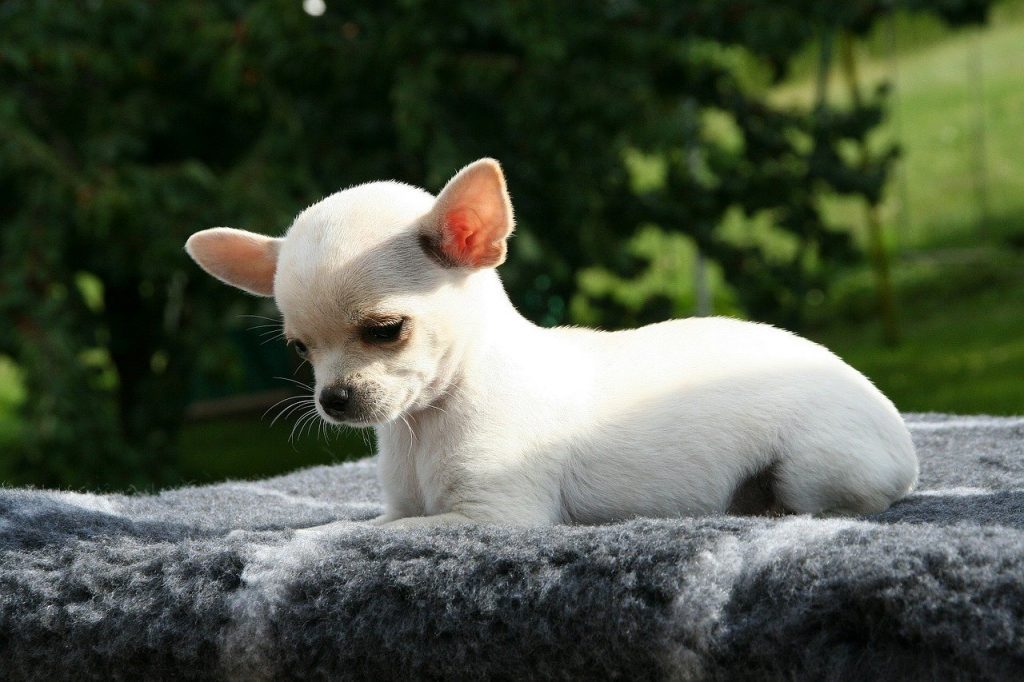

What are the most recurrent health conditions in the Chihuahua?
The Chihuahua is a generally healthy dog breed, with quite a long life expectancy. They can live between 12 and 20 years. . But just like other breeds, there are several health conditions that are more common in the Chihuahua as they are usually genetically inherited. This does not mean that your dog will one day have any of these conditions.
The most common health problems in the Chihuahua are the following:
- Injuries: because of their small size, Chihuahuas are quite fragile dogs, making them prone to injuries. They will love to climb on furniture such as sofas and beds. But accidents can happen and they can fall off and get hurt. They can also accidently get hurt by their owner, because of their fragile body. They will love you so much they will follow you around all the time and get in your way. Always be cautious to not step or sit on them.
- Dental Problems: the chihuahua naturally has weak teeth, making them prone to dental problems. Brushing their teeth 3 times a week can help prevent plaque build-up and more serious problems.
- Patellar Luxation: patellar luxation is a condition in which the kneecap slides out of its normal place. There are a few degrees of severity with this injury. The most common symptoms are a change in your dog’s way of running and hopping (holding one of their back legs up and hopping on three legs), changes in your dog’s behaviour due to pain, and even crying and yelping.
- Hypoglycemia: hypoglycemia can be quite common in small dogs. It is caused by low blood sugars. Symptoms of hypoglycemia are: dizziness, loss of appetite, trembling, weakness, drowsiness, and seizures in the most serious cases. If your dog shows some of these symptoms, take them to the vet right away.
- Tracheal Collapse: the trachea is a tube that links the mouth and nose of the dog to their lungs, carrying the air so they can breath. A collapse of this tube will make it difficult for your Chihuahua to breathe. The most common symptom is a chronic cough. A severe tracheal collapse will cause your dog to faint as they can not breathe. It is important to get your dog treated by your vet if you notice signs of this condition, as it can become serious and fatal with time.
- Obesity: obesity in dogs can be caused by overfeeding them. It is important to never overfeed your dog as they could become obese which can cause many different health problems such as joint aches, arthritis, pressure on the spine, difficulties in breathing, and overall drastically shorten their life span.
These are the most common health problems a Chihuahua could encounter throughout their life, but it does not necessarily mean they will. Keeping your dog healthy and taking good care of them will help prevent these conditions.
We recommend you visit your veterinarian every 6 months for a full check-up, even if your dog is perfectly healthy. Always follow their vaccine schedule, as well as external and internal worming. You should also consider getting your dog neutered, as it can have great benefits for your dog such as reducing the risk of cancer, uterine infections, prostate disease, and many more.
If you notice any change in our dog’s behaviour such as excessive sleeping, a loss of appetite, diarrhoea, frequent vomiting, difficulty in breathing, limping, or anything that appears abnormal to you, we recommend you visit your veterinarian as soon as possible.
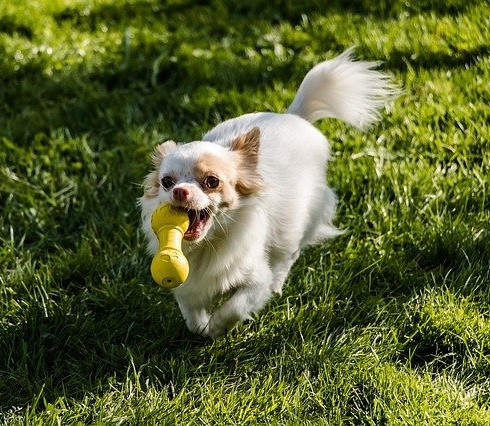

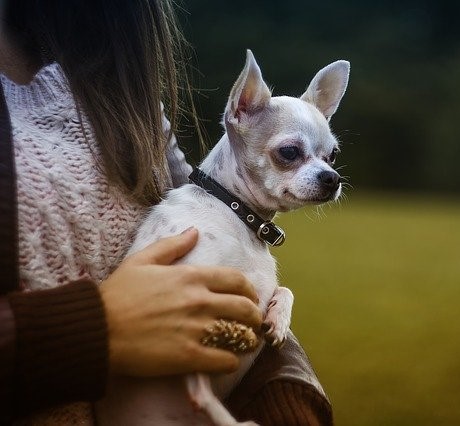

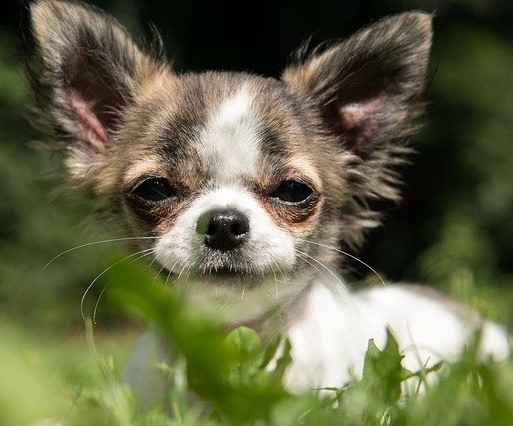

The Chihuahua is an amazing dog that you will love more than anything and that will love you more than anything in return. They are the cutest little thing and the perfect companion if you love snuggles with your doggy, and if you are ready to take on their big personalities. Often seen as difficult dogs to raise, they are in reality the same as every dog and just deserve a family that will know how to take proper care of them. If you think the Chihuahua is the right dog for you and would like to adopt one, think about checking your local shelters before buying from a breeder.
